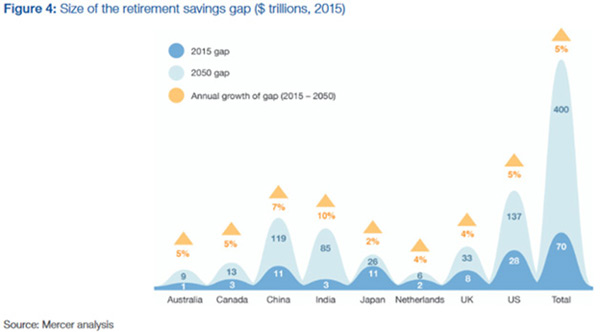Last year, a World Economic Forum study estimated that the US, UK, Netherlands, Japan, Australia, Canada, and two emerging economies China and India will have a $400 trillion retirement savings shortfall by 2050.

That’s how much money we need to ensure that everyone of retirement age will receive 70% of their working income.
This is more than the entire planet’s annual GDP! And it doesn’t even include most of Europe. Unless those countries somehow find the cash, they will break the promises they’ve made to today’s workers.
$400 trillion sounds like a lot of money. But if you added the rest of the countries, you should add probably another $250 trillion to get the total global retirement gap.
Your mileage may vary by country and demographics.
And for many countries, like the US, that doesn’t include healthcare and other obligations. I actually haven’t done that calculation yet, but we may scare one quadrillion dollars. That’s in a global economy that is less than $80 trillion today.
Promises like these are debt, whether they show as such on the balance sheet or not. Breaking them is equivalent to debt default. The creditors (workers) will certainly perceive it that way.
The Blessing and the Curse
The main driver of this problem is increasing life expectancies.
Reaching age 100 is already less remarkable than it used to be. That trend will continue.
Of course, we may be in better health at those advanced ages than people are now. Could 80 be the new 50? We’d better hope so, because the math is bleak if people stop working at age 65–70. And we see it in the lack of workers available out in the real world.
This idea of spending decades in leisure before your final decline is unfeasible and is quickly reaching its limits. Most of us will work well past 65, whether we want to or not.
What about the millions presently in retirement, or nearly so? That’s a big problem,
And this is going to get worse as the new anti-aging technologies spread. Some are here now.
When the anti-aging tech kicks in, we will need add at least ten years to average life expectancies. And then I think age reversal will show up by the early 2030s and be ubiquitous by the 2040s.
That’s great news for those who want to live longer, younger, and healthier, but it will force radical changes in our retirement and work.
Meanwhile, automation will be killing millions of jobs.
Magical Thinking
Look what we’re trying to do in both the US and Europe.
We think a growing number of people can spend 35–40 years working and saving, then stop working and go on for another 20-30-40 years at the same comfort level. And we think this will happen all while fewer workers pay into the system each year.
I’m sorry, but that is magical thinking at its worst. It is not what the earliest retirement schemes envisioned at all.
They tried to provide for the relatively small number of elderly people who were unable to work. Life expectancies were such that most workers would not reach that point, or at least live only a few years between retirement and death.
When Franklin Roosevelt created Social Security for people over 65, life expectancy was roughly around 56. US retirement age would now be around 82 if the retirement age had kept up with life expectancy. Try and sell that to voters.
Worse, generations of politicians have convinced the public that not only is this possible, it is guaranteed. Many believe it themselves. They aren’t lying so much as just ignoring reality. But it does get them votes.
Politicians made promises they can’t possibly keep, but the public arranges their lives assuming the impossible will happen. It won’t.
How do we get out of this? We’re all going to make a big adjustment. If the longevity breakthroughs I expect happen soon (as in the next 10–15 years), we may be able to do it with less pain, but it is still going to require large and significant lifestyle changes.
Retirement will be shorter but better, because we’ll be healthier.
That’s the best case, and I think we have a fair chance of seeing it, but not without a lot of adjustment first. How we get through that process is the most important question.
I’m not optimistic because compromise is becoming a lost art. Politics in both the US and much of Europe is an echo chamber where we mostly talk to ourselves and those who are like-minded.
We ignore the other side, treating them as socially unacceptable lepers. We have lost the ability to disagree amicably and rationally.
Not so long ago, Ronald Reagan and Tip O’Neill could sit down and work on Social Security. Bill Clinton and Newt Gingrich could sit down and not only modify welfare but balance the budget. Those days are gone.
When some librarians think the children’s books by Dr. Seuss are racist and therefore unacceptable for a public library, the quality of civil discourse is spiralling rapidly downward.
I do not like that, Sam I am.
Join hundreds of thousands of other readers of Thoughts from the Frontline
Sharp macroeconomic analysis, big market calls, and shrewd predictions are all in a week’s work for visionary thinker and acclaimed financial expert John Mauldin. Since 2001, investors have turned to his Thoughts from the Frontline to be informed about what’s really going on in the economy. Join hundreds of thousands of readers, and get it free in your inbox every week.




